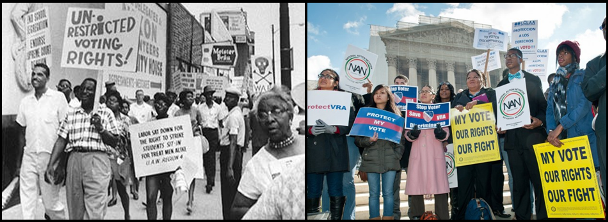 |
| Left, a circa 1960 photo of African Americans marching for equal voting rights. The Voting Rights Act was passed in 1965. Right, a 2013 rally in front of the U.S. Supreme Court where, with a 5 to 4 vote, the Court’s conservative majority gutted a key provision of the landmark law. |
The U.S. Supreme Court has struck down a key section of the landmark Voting Rights Act of 1965.
In a 5 to 4 ruling, the Court’s conservative majority said Section 4 of the Act, which outlines the formula for determining which states require federal oversight of elections, used “decades-old data relevant to decades-old problems.” The decision, authored by Chief Justice John Roberts and joined by Justices Antonin Scalia, Anthony Kennedy, Clarence Thomas and Samuel Alito, states that Congress “may draft another formula based on current conditions.”
The court did not strike down Section 5 of the law, the part which requires all or parts of certain states, mainly those in the South with a history of racial discrimination, to receive federal approval before making changes to voting laws and procedures.
“We need the Voting Rights Act now more than ever,” said Diane Babineaux, Chief of Staff to the IAM International President. “In his decision, Justice Roberts said times have changed and he’s right. The tactics used in 1965 to disenfranchise minority voters may no longer exist as they did then but the problem has hardly disappeared. A new, more sophisticated bag of tricks has emerged to take their place – repressive voter ID laws, unfair redistricting, long lines and voter misinformation campaigns. For the Supreme Court to leave minority voters unprotected is a major blow to our democracy.”
For a complete look at the decision, click here.